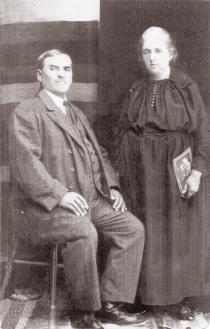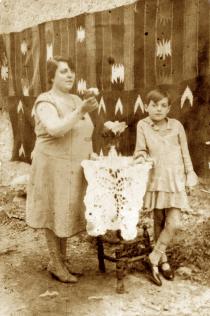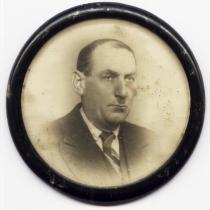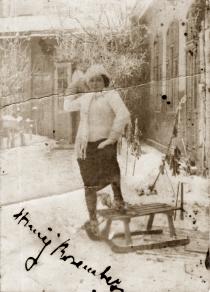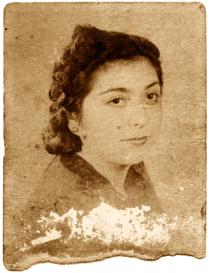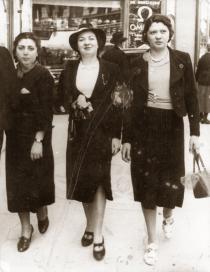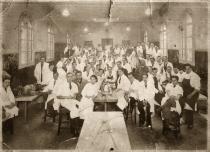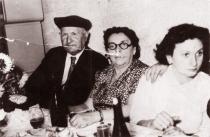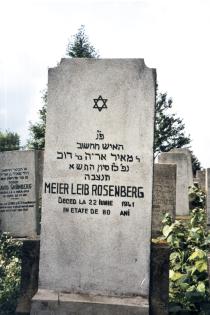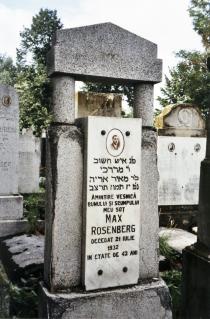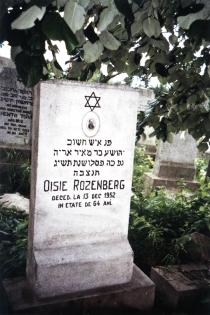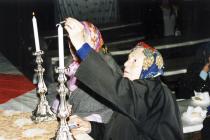This is my father, Oisie Rosenberg. This is a formal photo, taken in a studio, I think sometimes in the 1930s, the last years before Wolrd War II.
My father was born in 1887, in the countryside, in Bacau County. His native tongue was Yiddish, but he spoke Romanian with us. After he graduated highschool, his father sent him to study in Paris. He stayed there for 4 years, but didn’t graduate. He returned to Bacau right before World War I, met my mother and got married. He was in the Romanian army during World War I.
After the war, my father worked for a lumber enterprise in Tisita, Vrancea County. At the time of my birth [in 1921], he owned a store in Prajesti, then in Nadisa. It was a small store and it was run by my father alone, without any other employees. He sold everything. He later worked as a clerk for the Singer sales office in Bacau.
My father and my mother were not two of a kind. My father wasn't too religious. He was an open, earnest and decent man, who observed certain precepts; for instance, he helped sick people or destitute girls who were getting married. He did a lot of good, he helped anyone he could, he went to the temple, but he wasn't a bigot. He mastered the rules of etiquette and had grown up in a religious house, where he only learnt good things. So he taught us many things! He used to tell me: 'Always leave room for hello even if that person did you wrong; pretend you didn't notice! Let them regret they upset you instead of cursing you.' And he always said 'Be kind, give to others…' Oh, my God, what beautiful theories he had! He would tell us: 'Do not do wrong, for the wrong that you do will turn against you! There is no such thing as doing good and not getting good in return. There is no such thing as doing wrong and not getting wrong in return!
My father was an open, generous man. If you asked him for a loan and he didn't have the money, he would rather go and borrow from others himself than turn you down. We weren't rich. My [paternal] grandfather helped as long as he lived, because he had the means. But there wasn't one man my father didn't help when help was needed, there wasn't one man or one woman he didn't attend at the wedding when he was asked to - we, the Jews, consider it an act of great generosity to attend someone at his or her wedding. 'Mr. Rosenberg, my daughter's getting married and I need a second nas [each of the persons who attend the groom and the bride at the religious ceremony and are asked to perform the tasks required by the Christian ritual]…' We always have two nasi at a Jewish wedding. [Ed. note: Usually, there aren't any nasi at a Jewish wedding. In this particular case, it is probably a Christian influence.] 'So wouldn't you like to…' - 'All right.' And my father would come home and tell my mother: 'We're going to be nasi again.' - 'Again? Get out of here!' - 'Well, what was I supposed to do, I couldn't say no. The man came to me and I couldn't turn him down. You can't just make someone feel bad like that.' Also, when a boy was born, the fathers would come to my mother to ask for permission to name their sons after my maternal grandfather, who lived to be 94 [died in 1949]. And they would go: 'Mrs. Rosenberg, if it's a boy, will it be all right if I name him after your father?' It was said to bring good luck, because the man was so old. And, of course, my father would be present at the baptism with a nice present, and things like that.

